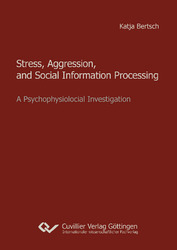| Areas | |
|---|---|
| Serie de libros (97) |
1383
|
| Nachhaltigkeit |
3
|
| Gesundheitswesen |
1
|
| Letra |
2379
|
| Medienwissenschaften | 16 |
| Teología | 57 |
| Filosofía | 102 |
| Derecho | 424 |
| Economía | 856 |
| Ciencias sociales | 418 |
| Ciencias del deporte | 48 |
| Psicología | 233 |
| Educación | 190 |
| Historia | 183 |
| Arte | 111 |
| Ciencias culturales | 167 |
| Literatur | 117 |
| Lingüística | 89 |
| Ciencias Naturales |
5409
|
| Ciencias Ingeniería |
1799
|
| General |
97
|
|
Leitlinien Unfallchirurgie
5. Auflage bestellen |
|
Erweiterte Suche
Stress, Aggression, and Social Information Processing (Tienda española)
A Psychophysiological Investigation
Katja Bertsch (Autor)Previo
Indice, Datei (25 KB)
Lectura de prueba, Datei (62 KB)
Aggression is a very common social behavior that causes enormous social and economic costs worldwide. Although the investigation of aggression has a long research tradition in psychology, still little is known about the neural underpinning and biological correlates of aggression and violence. Modern models (i.e., the General Aggression Model of Anderson and Bushman, 2002) assume that aggression is influenced by multiple person and situation variables mediated by affect, cognition, and arousal. This thesis examines stress as an important promoting factor for aggression and violence. First, results from psychological, neuroscientific, and animal studies on the neural basis of aggression and the relationship of stress and aggression are gathered and discussed. The influence of stress and aggression on social information processing, i.e., the processing of emotional facial expressions is then investigated in healthy individuals with three consecutive experimental studies using psychophysiological (EEG), endocrine (cortisol), and behavioral data. The experimental induction and measurement of aggression together with a pharmacological manipulation of the stress hormone cortisol as well as the induction of feelings of social exclusion contribute to a unique combination of psychosocial paradigms with psychophysiological measures. Finally, new research questions are generated based on the results of these studies and the existing literature.
| ISBN-10 (Impresion) | 3869553235 |
| ISBN-13 (Impresion) | 9783869553238 |
| ISBN-13 (E-Book) | 9783736933231 |
| Idioma | Inglés |
| Numero de paginas | 136 |
| Edicion | 1 Aufl. |
| Volumen | 0 |
| Lugar de publicacion | Göttingen |
| Lugar de la disertacion | Universität Trier |
| Fecha de publicacion | 06.05.2010 |
| Clasificacion simple | Tesis doctoral |
| Area |
Psicología
Biología |








